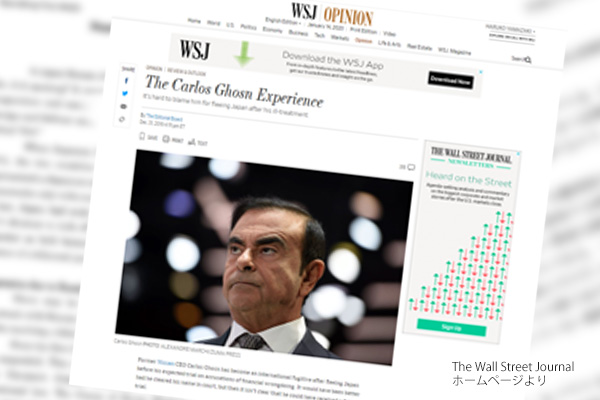The leading U.S. newspaper Wall Street Journal carried a series of editorials defending former Nissan CEO Carlos Ghosn who fled Japan while being on bail. The WSJ said that it is hard to blame him for fleeing Japan after his ill-treatment under a rough Japanese justice system and that Ghosn offered a compelling case for his innocence at a press conference. Given that the newspaper boasts of its great international influence, such editorials cannot be overlooked.
Editorials vindicate Ghosn’s escape from Japan
“It isn’t clear that he could have received a fair trial,” said a WSJ editorial on the journal’s online edition on December 31 just after Ghosn’s announcement of his successful escape to Lebanon, suggesting that the reason for the escape could be Japan’s “rough justice.” The editorial also argued that Ghosn’s failure to disclose compensation and his other alleged financial wrongdoings subjected to his indictment should have been dealt with in the boardroom instead of being brought into a criminal court. “The suspicion hangs over the case that one or more individuals set out to use opaque governance rules to oust a foreigner from a position of Japanese corporate power,” it said as if Japan’s nativism were behind the case.
After Ghosn tried to justify his escape at a 2.5-hour theatrical press conference in Lebanon, a WSJ editorial on January 8 (online edition) positively assessed it was a “tour de force of self-exoneration.” Ghosn’s account that Nissan executives and Japanese officials worked together against him “seems plausible for those of us who have watched Japan Inc. for decades,” it said. It concluded that Ghosn’s case “sounded credible.”
The WSJ’s unfair defense of Ghosn based on sketchy knowledge about Japan is remarkable among major media in the world. The New York Times, another leading U.S. newspaper, is more neutral. “Mr. Ghosn needs to make a far more convincing case than he did at his theatrical news conference if he is serious about clearing his name,” an NYT editorial on January 8 said, while urging Japan “to take a close look” to see whether its justice system, including the interrogation of a suspect without a lawyer, is due for a rethinking.
Japan should promote international public relations
In response to Ghosn’s press conference, the Japanese government released Justice Minister Masako Mori’s comment that Ghosn’s escape from Japan runs counter to terms and conditions for bail and could constitutes a crime that would not be condoned in any country. Unusually, the comment’s English and French versions were put on the Ministry of Justice website.
The response itself was good, but the Japanese government’s international public relations efforts should not end with the translated comment on the website. Specifically the WSJ has repeatedly criticized Japan’s justice system through its editorials since Ghosn was arrested in November 2018. The government should further promote efforts to deepen international understanding about Japan’s stance through not only sending Minister Mori’s letter to the WSJ editor (that was published by the WSJ online on January 14) but also placing an advocacy ad on the newspaper and providing its reporters with an opportunity to interview Ms. Mori.
Yasushi Tomiyama is a senior research fellow and a Planning Committee member at the Japan Institute for National Fundamentals. He is a former foreign news editor and bureau chief at Washington, D.C., London and Bangkok for the Jiji Press.


